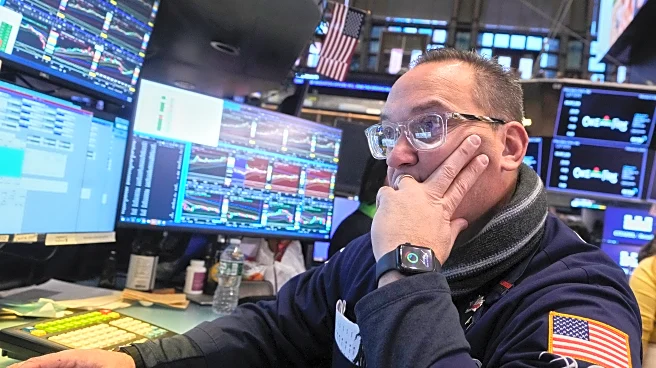Rapid Read • 8 min read
The U.S. stock market is experiencing significant volatility as the S&P 500 nears a price-to-earnings (P/E) ratio of 30, a level historically associated with market downturns. Despite record highs in stock prices, underlying economic fundamentals suggest overvaluation. Recent data from the Bureau of Labor Statistics indicates a slowdown in job growth, with only 73,000 jobs added in July and downward revisions for previous months. GDP growth has also been sluggish, falling short of the Trump administration's targets. Additionally, the impact of tariffs imposed by President Trump is beginning to affect inflation, with the producer price index rising by 0.9% in June. Companies are starting to pass these costs onto consumers, further straining the economy.
AD
The current stock market conditions could have significant implications for investors and the broader U.S. economy. High P/E ratios suggest that stocks may be overvalued, increasing the risk of a market correction. The slow job growth and GDP expansion indicate potential economic stagnation, which could affect consumer spending and business investment. The tariffs imposed by President Trump are contributing to inflationary pressures, potentially reducing disposable income for American consumers. If the Federal Reserve decides to cut interest rates, it may provide temporary relief, but the long-term economic outlook remains uncertain.
Investors are closely watching for potential Federal Reserve interest rate cuts, which could influence market dynamics. The Fed is expected to consider rate reductions in September and possibly further cuts in 2026. However, the 10-year Treasury yield remains steady, indicating that significant changes in borrowing costs may not occur immediately. Companies may continue to pass tariff costs onto consumers, leading to higher prices and potentially reduced consumer spending. The real estate market may remain constrained by high mortgage rates, affecting homeownership rates among young families.
The current economic situation raises questions about the sustainability of stock market growth and the long-term impact of tariffs on the U.S. economy. The high P/E ratios reflect investor optimism, but they also highlight the disconnect between stock prices and economic fundamentals. The tariffs, while intended to protect domestic industries, may ultimately hinder economic growth by increasing costs for consumers and businesses. The potential for a market correction could lead to broader economic challenges, affecting employment, investment, and consumer confidence.
AD
More Stories You Might Enjoy













